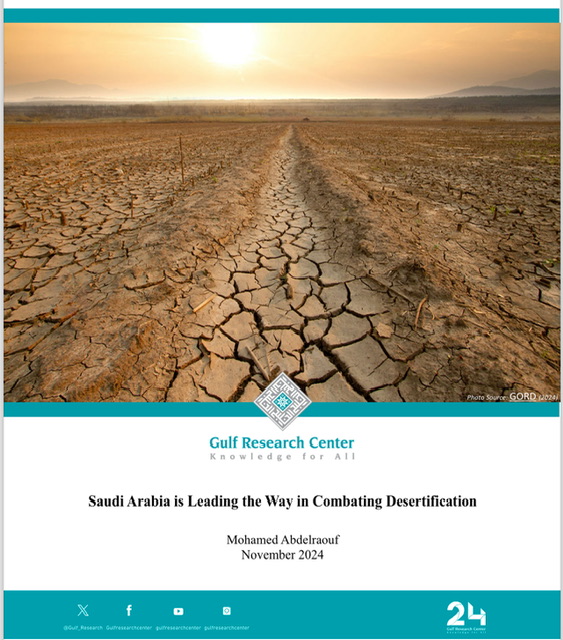
The United Nations Convention to Combat Desertification’s (UNCCD) sixteenth session of the Conference of Parties (COP16) will convene in Riyadh, Saudi Arabia, from December 2-13, 2024. This important event seeks to enhance cooperation between the 197 countries that are party to the UNCCD convention and search for practical solutions in rehabilitating degraded land to combat the effects of drought, fight climate change, improve food security, and accelerate the green transition.
This year’s negotiations in Riyadh mark the 30th anniversary of the UNCCD, one of the three Rio conventions, alongside those on climate change and biodiversity. Land degradation and desertification are critical issues for Saudi Arabia and the GCC countries as a whole, as they continue to be some of the most significant environmental challenges in the region, with some countries suffering nearly 100% desertification according to the UN Environment Programme (UNEP).
About 95 percent of Saudi Arabia is desert. Still, the Kingdom exhibits a wide variety of landforms and habitats consisting of mountains, steppes, marshes, coastal plains, dunes, alpines, and deserts. It is characterized by extreme climatic conditions in the form of long, hot, dry summers with short, cool, and only lightly wet winters, with rainfall as little as 50 mm or less. However, according to climatic patterns, it is normal for the region to witness flash rain every few years.
With its increase in population, the demand on land and water resources in Saudi Arabia and the whole Gulf region has exceeded their carrying capacity resulting in intensification of land degradation and desertification. Following the discovery of oil in the early 1930s, the countries in the region experienced drastic socio-economic and environmental changes, particularly during the last four to five decades, which further catalyzed the land degradation process.
Desertification is further exacerbated by global climate change. Climate change effects exacerbate the availability of already scarce water resources, and increased temperatures, leading inevitably to more desertification.
n addition, one of the main drivers of environmental pressure in the region is rapid urbanization and industrialization, accompanied by mass immigration of foreign workers. This has led to the conversion of agricultural lands, rangelands, and coastal areas for infrastructure development. Such unsustainable land use has contributed to the loss of biodiversity and intensified desertification.
Saudi Arabia Pioneer Initatives
Saudi Arabia has taken initiatives to combat desertification, including policy and institutional measures at the national and regional levels, as well as accession to various international agreements and conventions. Forests, artificial or natural, are considered effective means to control shifting sands and regulate the spread of deserts.
Saudi Arabia is leading the way with its pioneering initiatives for land restoration. Launched in 2021, the Saudi Green Initiative aims to turn 30 percent of Saudi Arabia’s land into nature reserves; plant 10 billion trees; and restore 40 million hectares of degraded land. The country is also leading efforts to plant an additional 40 billion trees across the region through the Middle East Green Initiative.
The fourth edition of the Saudi Green Initiative Forum will take place in Riyadh alongside the UNCCD COP16, demonstrating the Kingdom’s dedication to improving the quality of life for current and future generations and addressing the vast environmental challenges facing the region. According to the UN Environment Programme, the combined target of 50 billion trees between the two initiatives represents 5 percent of the global afforestation target – the equivalent of restoring 200 million hectares of degraded land. In addition, Saudi Arabia has partnered with the Group of 20 (G20) nations and the UNCCD to launch the G20 Global Land Initiative, which aims to cut degradation by 50 percent by 2040.
Another pioneering project that can prove successful in combating land degradation in desert areas is the Al Baydha Project, a land restoration initiative in western Saudi Arabia, which aims to transform the lives of Bedouin tribes through terrace farming and water management. The project serves as a model for others especially as it carefully examines and adopts suitable land management practices such as rotational grazing, rainwater collection, and a system based on nomadic pastoral, as well as traditional hema (protection) systems. It is a model example of how nature-based solutions can be environmentally and economically viable in fighting climate change and combating desertification.
Saudi Arabia’s hosting of UNCCD COP16 will be an important milestone in mobilizing efforts to preserve land of all kinds, reduce their degradation, and combat desertification and the effects of drought, as well as an opportunity for policymakers and experts to exchange information and best practices. It comes at a key moment following the disappointing outcome of the UNFCCC COP29 and at a time of increased global tensions, conflicts, and economic hardship. Saudi Arabia has the opportunity to oversee the diplomatic push for ambitious resolutions, actions, and investments in resolving key agenda items for COP16, which could potentially have a spill-over effect on other critical global environmental and economic issues.
*Dr. Abdelraouf is the Director of the Environmental Security and Sustainability Research Program at the Gulf Research Center.
